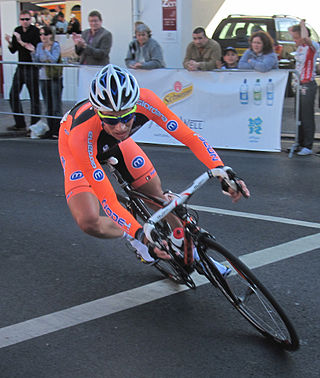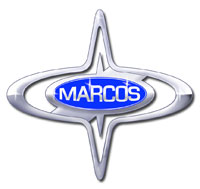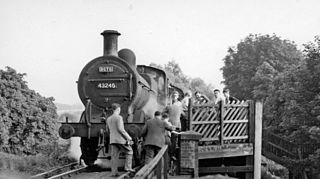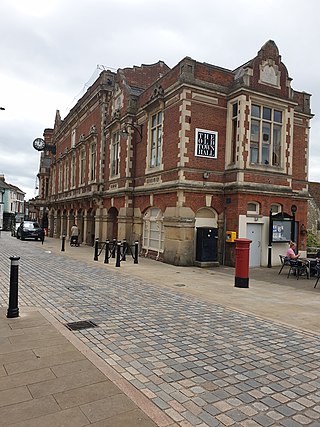Related Research Articles

Hemel Hempstead is a town in the Dacorum district in Hertfordshire, England. It is located 24 miles (39 km) north-west of London; nearby towns include Watford, St Albans and Berkhamsted. The population at the 2021 census was 95,961.

Steering is the control of the direction of motion or the components that enable its control. Steering is achieved through various arrangements, among them ailerons for airplanes, rudders for boats, tilting rotors for helicopters, and many more.

British Leyland was an automotive engineering and manufacturing conglomerate formed in the United Kingdom in 1968 as British Leyland Motor Corporation Ltd (BLMC), following the merger of Leyland Motors and British Motor Holdings. It was partly nationalised in 1975, when the UK government created a holding company called British Leyland, later renamed BL in 1978. It incorporated much of the British-owned motor vehicle industry, which in 1968 had a 40% share of the UK car market, with its history going back to 1895. Despite containing profitable marques such as Jaguar, Rover, and Land Rover, as well as the best-selling Mini, BLMC had a troubled history, leading to its eventual collapse in 1975 and subsequent part-nationalisation.

The Triumph Motor Company was a British car and motor manufacturing company in the 19th and 20th centuries. The marque had its origins in 1885 when Siegfried Bettmann of Nuremberg formed S. Bettmann & Co. and started importing bicycles from Europe and selling them under his own trade name in London. The trade name became "Triumph" the following year, and in 1887 Bettmann was joined by a partner, Moritz Schulte, also from Germany. In 1889, the businessmen started producing their own bicycles in Coventry, England.

Marcos Engineering was a British sports car manufacturer. The name derives from the surnames of founders Jem Marsh and Frank Costin.

Lotus Elan is the name of two separate ranges of automobiles produced by Lotus Cars. The first series of cars was produced between 1962 and 1975 as a rear-wheel drive vehicle. The second series was produced between 1989 and 1995 as a front-wheel drive vehicle.

The Nickey line is a disused railway that once linked the towns of Hemel Hempstead and, initially, Luton but later Harpenden via Redbourn, in Hertfordshire, England. The course of most of the railway has been redeveloped as a cycle and walking path, and is part of the Oxford to Welwyn Garden City route of the National Cycle Network. It is approximately nine miles (14 km) long.

The Triumph TR4 is a sports car produced by the Triumph Motor Company from 1961 to 1965. Successor to the TR3A, the TR4's chassis and drivetrain are closely related to those of its predecessor, but with an updated body designed by Michelotti.

The Triumph Spitfire is a British sports car manufactured over five production iterations between 1962 and 1980. Styled for Standard-Triumph in 1957 by Italian designer Giovanni Michelotti, the Spitfire was introduced at the London Motor Show in 1962. It was manufactured at the Standard-Triumph Canley works, with approximately 315,000 produced over 18 years.

The Triumph Herald is a small two-door car introduced by Standard-Triumph of Coventry in 1959 and made through to 1971. The body design was by the Italian stylist Giovanni Michelotti, and the car was offered in saloon, convertible, coupé, estate and van models, with the latter marketed as the Triumph Courier.
R.T. Quaife Engineering, Ltd. is a British manufacturer of automotive drivetrain products. It designs and manufactures motorsport and performance orientated gearboxes, gearkits, differentials, steering racks and axle kits, along with many other associated drivetrain products.
Lucas Industries plc was a Birmingham-based British manufacturer of motor industry and aerospace industry components. Once prominent, it was listed on the London Stock Exchange and was formerly a constituent of the FTSE 100 Index. In August 1996, Lucas merged with the American Varity Corporation to form LucasVarity.

Boxmoor is part of Hemel Hempstead in Hertfordshire. It is within the district of Dacorum and comprises mainly 19th-century housing and meadowland, with transport links from London to the Midlands. At the 2011 Census, the population of Boxmoor was included in the Dacorum ward of Bovingdon, Flaunden and Chipperfield.
NEC Software Solutions, formerly Northgate Public Services, is a provider of specialist software and outsourcing services for the public sector and is based in the United Kingdom. This followed its acquisition by NEC Corporation in January 2018.

Australian Motor Industries (AMI) was an automobile assembly firm that was significant in the early history of the automotive industry in Australia.

The Bluebird-Proteus CN7 is a gas turbine-powered vehicle that was driven by Donald Campbell and achieved the world land speed record on Lake Eyre in Australia on 17 July 1964. The vehicle set the FIA world record for the flying mile at 403.1 mph (648.7 km/h).

The TVR M series is a line of sports cars built by automaker TVR between 1972 and 1979. The series replaced the outgoing TVR Vixen and Tuscan models, and is characterized by a common chassis and shared body style. As with other TVR models before and since, the M-series cars use a front mid-engine, rear-wheel drive layout and body-on-frame construction. The bodies themselves were built from glass-reinforced plastic (GRP). The era of the M series is commonly associated with Martin Lilley who, together with his father, took ownership of the company on 30 November 1965.

Rane (Madras) Ltd is a part of the Rane group of companies involved in the manufacture and distribution of steering and suspension systems. The main components manufactured by the company include Manual Steering Gear Products (SGP) and Suspension & Steering Linkage Products (SSLP). The other products include tie rod assemblies, drag link assemblies, center link assemblies and gear shift ball joints. Automobile companies that use its products include Ashok Leyland, Volvo, M&M, Tafe, Tata among many others. Tata motors remains its major customer and is the primary parts manufacturer for Tata's Nano. The company has also set up a dedicated plant for Tata Nano in Sanand, Gujarat. The company was forced to change its manufacturing facility from West Bengal to Gujarat after Tata moved out.

The Bury is a building of historical significance in Hemel Hempstead in the county of Hertfordshire, England. It was erected in about 1790 by an attorney who worked in the town. It was the residence for the next two centuries of many notable people. It is now owned by the Dacorum Borough Council and is Grade II* listed.

The Old Town Hall is a municipal building in the High Street, Hemel Hempstead, Hertfordshire, England. The town hall, which was the meeting place of Hemel Hempstead Borough Council, is a Grade II listed building.
References
- ↑ "The Record Breaking Bluebird Cars". Archived from the original on 15 July 2011. Retrieved 5 January 2019.
- ↑ "A BRIEF HISTORY OF TRIUMPH" (PDF). Texas Triumph Register. June 2006. p. 39. Archived from the original (PDF) on 16 August 2006.